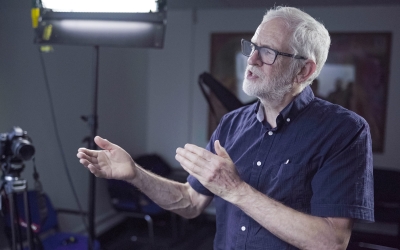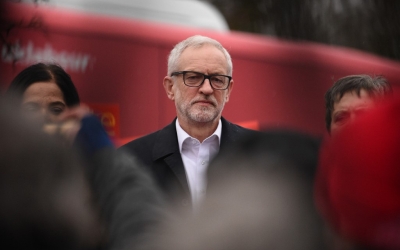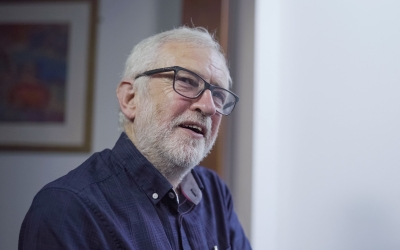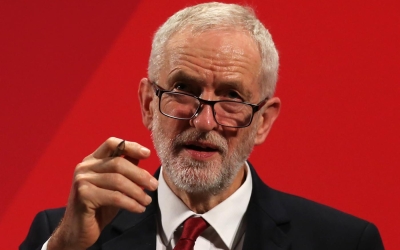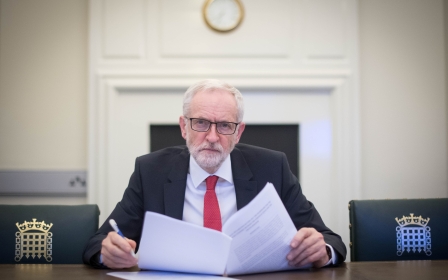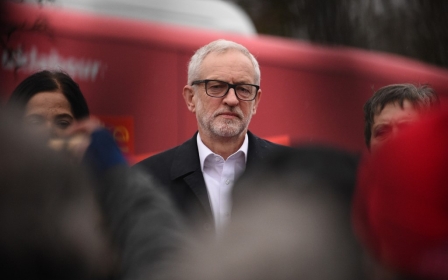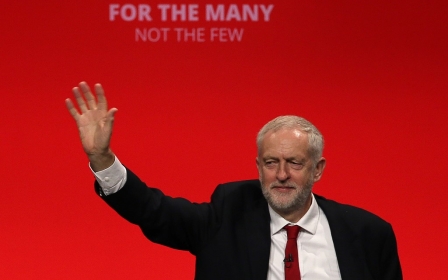EXCLUSIVE: Jeremy Corbyn questions impartiality of EHRC antisemitism inquiry
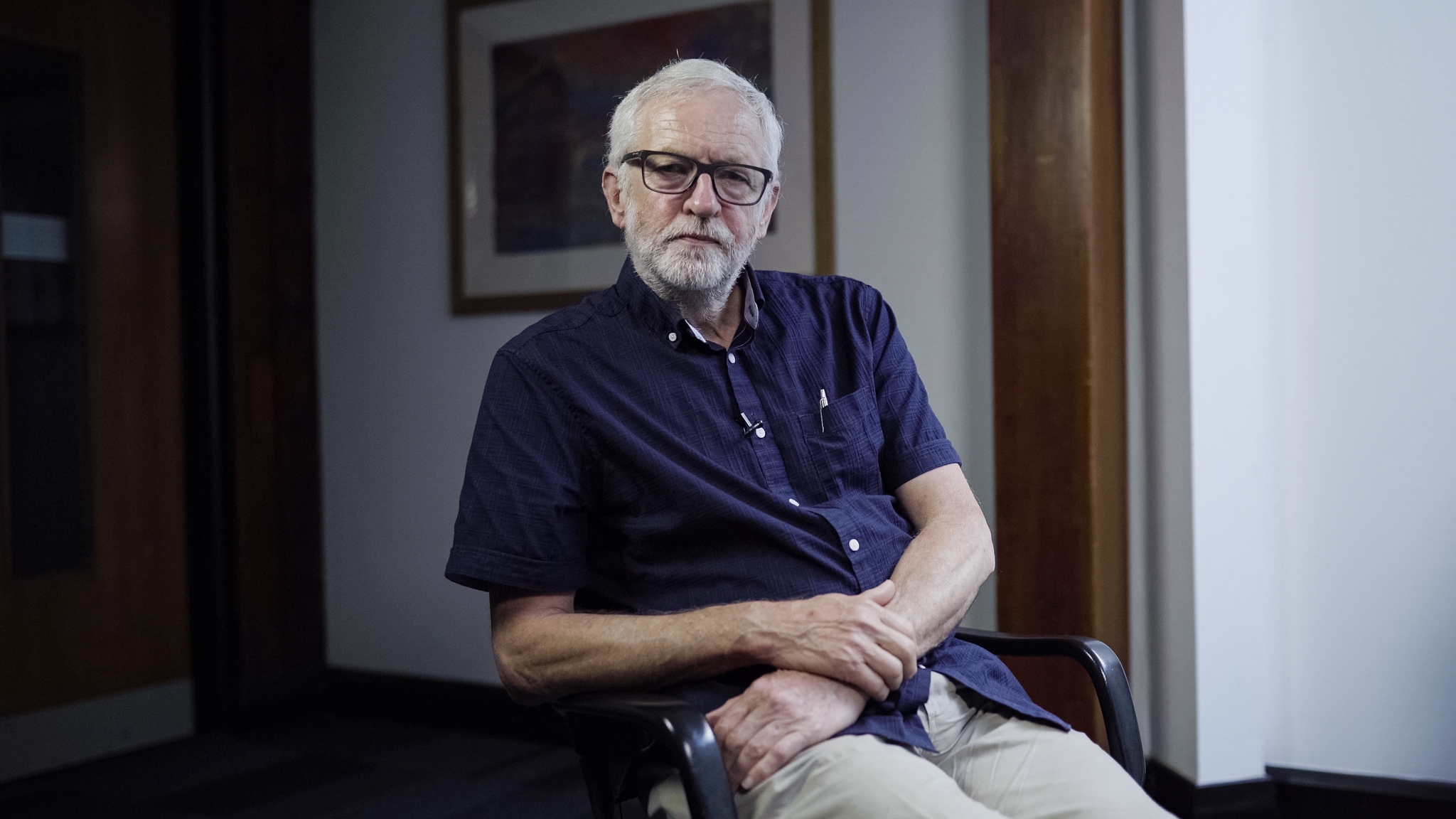
Jeremy Corbyn, whose leadership of the Labour Party was dogged by allegations of antisemitism within its ranks, has cast doubt on the impartiality of the forthcoming inquiry by the Equality and Human Rights Commission (EHRC).
Speaking to Middle East Eye in his first major interview since stepping down as leader in April, Corbyn also said that allegations that he had tolerated antisemitism were "wrong and extremely unfair" and claimed credit for putting in place more robust processes to tackle the issue.
MEE will broadcast the full interview with Corbyn on Tuesday.
Commenting on the EHRC, which is investigating Labour antisemitism allegations under Corbyn's leadership, he said the body was “part of the government machine” whose independence had been “taken away” by the ruling Conservative party.
Asked whether he believed its lack of independence would colour the EHRC's report, Corbyn replied: “Let’s see what happens.”
“I think it's quite significant that the Conservative government has underfunded the Equality and Human Rights Commission… and for some reason, which I don't fully understand… decided to take away its independent status and make it part of the government machine,” Corbyn said.
The EHRC was established in 2006 as a “non departmental public body”. It describes itself as independent of government, though it says it “works with government to influence progress on equality and human rights”.
The former Labour leader said that had he won power he would have restored the principle of the independence of the EHRC and widened its powers.
Labour and antisemitism allegations
+ Show - HideLabour is the subject of an ongoing inquiry by the UK's equalities watchdog, the Equality and Human Rights Commission, over complaints of antisemitism within the party.
A number of MPs, several of whom were Jewish, quit the party under Jeremy Corbyn's leadership over what they said had been its failure to get a grip on alleged antisemitism. Corbyn was also criticised over his handling of the controversy by senior figures including Tom Watson, his longtime deputy, in what was described as a “civil war” within the party.
In a resignation statement in November, Louise Ellman, an MP in Liverpool and a Labour member for 55 members said that antisemitism within the party had “become mainstream” under Corbyn's leadership.
Following Ellman's resignation, a Labour spokesperson said: “Jeremy Corbyn and the Labour party are fully committed to the support, defence and celebration of the Jewish community and continue to take robust action to root out antisemitism in the party and wider society.”
The party has said it “completely rejects any claim that Labour is antisemitic” and says it is taking “decisive action” against antisemitism.
That has included suspending prominent members including former London mayor Ken Livingstone, who subsequently quit the party, and Chris Williamson, an MP and Corbyn ally who said Labour had been "too apologetic" about antisemitism and who also resigned from the party.
The party has also adopted a contentious definition of antisemitism proposed by the International Holocaust Remembrance Alliance, despite concern that the move could limit criticism of Israeli policies and support for the rights of Palestinians.
An internal Labour report leaked in April suggested that opponents of Corbyn within the party had obstructed efforts to address the issue. The leaking of the report is currently the subject of a party investigation.
Corbyn’s comments came after over 100 mosques and 40 imams wrote a letter accusing the EHRC of a “dereliction of responsibilities” over its refusal to investigate allegations of Islamophobia within the Conservative party.
The letter queried whether the EHRC was too close to the Conservative party, noting that two board members, including the chairman, David Isaac, held positions at a law firm, Pinsent Masons, which has advised the Conservative government.
The EHRC launched its investigation into Labour after legal complaints made in 2018 by the Campaign Against Antisemitism (CAA) and the Jewish Labour Movement, which claimed the party had breached equalities law.
It has rarely investigated political parties. In 2010 it ordered the far-right British National party to comply with race relations law.
A spokesperson for the EHRC rejected claims that its chairman Isaacs had a conflict of interest.
“We are an independent regulator and take our impartiality very seriously. We have robust procedures and policies in place to manage conflicts of interests or perceived conflicts of interests. Since taking up his role as chair, David Isaac has not been involved in or profited from any work for government departments or political parties. This arrangement was put in place during his appointment process,” he said.
Leaked report
Speaking to MEE, Corbyn also responded to the evidence of a leaked report submitted to the EHRC by Labour as part of its response to the inquiry, which appeared to suggest that Corbyn's leadership, and his efforts to deal with antisemitism complaints, had been undermined by officials within the party's governance and legal unit.
Corbyn is still a Labour member of parliament for the Islington North constituency in London.
While saying he would not comment on the report, which is now the subject of a party inquiry, Corbyn did comment about the culture inside Labour headquarters in the run-up to the 2017 general election, when a surge of support for the party saw it gain 30 seats and win 40 percent of the vote, almost forcing a hung parliament.
He said: “I always knew that there was a culture in the Labour party that was not a healthy one, of an almost self-perpetuating bureaucracy. All organisations have a degree of self-perpetuating bureaucracy about them.
"I wanted to change the way in which the party operated by changing from being a solely bureaucratic machine that administered the party, disciplined members and observed the rules and so on, into a community-organising base of the party.”
Corbyn described the party machine as “leaden-footed” and said those running it did not appreciate the popular reception and support for the manifesto that he saw on the campaign trail.
Asked whether it was leaden-footed or just plain hostile, Corbyn replied: “That’s an interesting question.”
One official was quoted in the report as writing in a WhatsApp message to other party officials as exit polls predicted a hung parliament: “They are cheering and we are silent and grey faced. Opposite to what I had been working towards for the last couple of years!!”
Corbyn agreed it was gut-wrenching to read this.
“Yeah, of course. Because I didn't spend much time in the party head office in 2017. It's not my job to be there all the time; I was out on the road… I did 100 events all over the country during that period,” he said.
"There were others on my behalf, having these arguments about what were the priorities and there was still this argument, ‘We've got to be defensive' and I said, 'No, go out there, go to all the constituencies where we've got the outside chance of winning and go for it,’ and look at look at the places we gained.”
'They attacked me all the time on this. I think it is wrong, because I think I'm the one that actually introduced a process for dealing with it'
- Jeremy Corbyn
Corbyn called persistent claims that he had tolerated antisemitism in the party, including those made in a BBC Panorama investigation devoted to the subject, “wrong and extremely unfair”.
The former leader claimed credit for cleaning up and professionalising the internal party mechanism for investigating such cases.
“They attacked me all the time on this. I think it is wrong, because I think I'm the one that actually introduced a process for dealing with it; there has to be an examination of the way in which that process operated.
“I then realised there was a logjam building up in the party on individual cases. And so I proposed the expansion of the National Constitutional Committee, which was duly done in order to deal with cases more quickly. I also introduced a system where egregious cases could be dealt with very quickly, but still within the ambit of rules of natural justice. So I feel that the attacks on me have been extremely unfair on this.”
When he investigated, he found the numbers of cases to be “actually very small”, but refusing to be judge, jury and decision-maker on each case, passed each one onto the party’s governance and legal unit.
The leaked 860-page document, entitled "The work of the Labour Party’s Governance and Legal Unit in relation to antisemitism, 2014-2019", said cases of alleged antisemitism were deliberately delayed.
Corbyn said: “That process needs to be examined very closely, how efficiently they dealt with those or didn't deal with those, and the party policy has to be one that we don’t tolerate antisemitism in any form.”
The leaking of the document is now the subject of an investigation launched by Corbyn’s successor, Keir Starmer.
Starmer has been lauded for setting out steps he is taking to tackle antisemitism within the party, with Jewish community leaders suggesting in a statement in April that he had “achieved more in four days” than his predecessor had in four years.
'Totally unacceptable'
Corbyn told MEE that he had taken steps to create a “robust process” to deal with allegations of antisemitism within the party soon after becoming leader. He described antisemitism as “absolutely, totally unacceptable in any form”.
“I grew up in a family that were obviously opposed to racism in any form. My mum was there at Cable Street in 1936 [when anti-fascist demonstrators including Jewish and leftwing groups clashed with members of Oswald Mosley's British Union of Fascists in east London].
“That's the sort of background I come from. When I became leader of the Labour party, I discovered that there were a small number of cases where people had been accused of antisemitic remarks within the party and there should be a process for dealing with them.
“I asked what the process was and I was not very satisfied. I didn't feel we had a very strong or robust process for dealing with this and then allegations were made, about people making antisemitic remarks at meetings and trolling people and being abusive to Jewish Labour MPs.
“Absolutely, totally unacceptable in any form. The numbers involved were actually very small. So, I asked [human rights lawyer] Shami Chakrabarti to do an investigation into this and produce a proposal, which she did; which was to have a stronger governance unit, have it independent of the party leadership and that cases should be referred to them for process.
"I had a very strong view in my office that I was not to be the judge, jury and decision-maker on each case. Any case that was brought to my attention - and some were, people wrote in and things like that - I didn't deal with it, I passed it straight on to the governance and legal unit.”
'I grew up in a family that were obviously opposed to racism in any form. My mum was there at Cable Street in 1936'
- Jeremy Corbyn
Corbyn said that tolerance of antisemitism throughout British history was unacceptable, claiming that Winston Churchill, the British prime minister during the second world war, had made antisemitic remarks "all through his life".
“When you think of Churchill's antisemitic remarks all through his life... the degrees of acceptance of... antisemitism throughout our history is huge. And I think there has to be a challenge to that or any form of racism. And that is what I tried to do within the party as party leader and it's what I spend my life doing.”
The allegation that Churchill, who became British prime minister during the second world war, held antisemitic views surfaced in a book in 2007. Richard Toye, then a lecturer at Homerton College Cambridge, unearthed an unpublished article written for Churchill and to be offered for publication in his name in the mid-1930s.
Toye’s book was vigorously disputed by Martin Gilbert, Churchill’s official biographer, who said that the article had been written by a journalist paid by Churchill to write pieces in his name who was also a member of Mosley’s fascist party.
“Someone else’s opinions, in an unpublished article, which never appeared in print under Churchill’s name, cannot be laid at Churchill’s door,” he wrote.
MEE asked Corbyn why he had not defended himself more robustly, especially when accused of being a racist to his face in the House of Commons by Margaret Hodge, a veteran Labour MP.
“Well, I do defend myself by pointing out my record on opposing racism in any form whatsoever in society, and I have done all of my life. Was I too tolerant of people? Well that’s an interesting question. My style of leadership is very different to others. I didn't want to be a dictator, I wanted to be a leader that built by consensus,” he replied.
Middle East Eye propose une couverture et une analyse indépendantes et incomparables du Moyen-Orient, de l’Afrique du Nord et d’autres régions du monde. Pour en savoir plus sur la reprise de ce contenu et les frais qui s’appliquent, veuillez remplir ce formulaire [en anglais]. Pour en savoir plus sur MEE, cliquez ici [en anglais].


